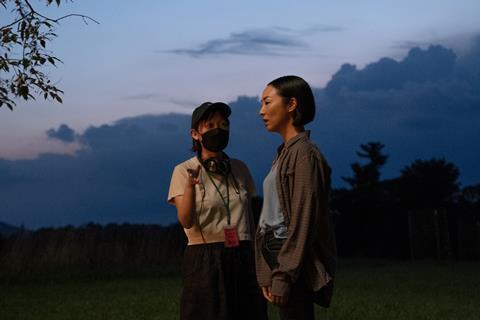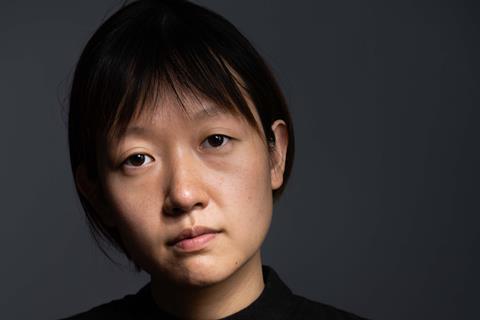
Celine Song’s first day of shooting her debut feature was not the warmest welcome to her new career. The experienced playwright and theatre director was shooting a boat scene, cruising past the Statue of Liberty for Past Lives, but there was a record-setting storm in New York City.
“I’ve never been on a film set before, and I show up on this set and it’s raining so hard you can’t see in front of your face,” Song says. “We’d had this really productive prep and we were feeling very prepared.” But they had not quite envisaged a storm of epic proportions. The crew and producers assured her it would clear — and, she reveals, “It did clear up and it was amazing.”
Song — who graduated from New York’s Columbia University with an MFA in playwriting in 2014 — was a successful, award-winning playwright and director when she decided it was time to make her first film, the intimate romantic drama Past Lives.
The day in the torrential rain was one of the big lessons learned from her first shoot. “You have to accept that a lot of filmmaking is out of your control — weather, or how cities are behaving,” she explains. “You can plan and plan and plan, but sometimes you have to accept the chaos on the day. That’s powerful for me because I’m a control freak. You have to believe there’s a way.”
Of course, some things were in her control — such as the personal nature of the story, about Nora and Hae Sung, two close childhood friends who are torn apart when Nora’s family emigrates from South Korea to Canada. More than two decades later, the adult Nora (Greta Lee) and Hae Sung (Teo Yoo) are reunited in New York for one week as they confront notions of destiny, love and the choices they have made in life — including Nora’s marriage to fellow writer Arthur (John Magaro).
Song, New York-based after being born in Korea and emigrating with her family to Canada, had tackled a range of topics in theatre — from the lives of traditional Korean female sea divers in Endlings to the breakdown of society and cannibalism in The Feast — but this particular love story seemed to cry out for a film. “I’m a huge fan of film. I feel part of the same world of dramatic storytelling, storytelling through performance. I was always interested in film… I think the form has to speak to the content. Because this story spans many decades and many continents, I thought it needed to be told cinematically.”
Audiences have certainly responded to her first venture into cinema — Past Lives was a Sundance and Berlinale hit and has been a box-office success in the US via A24 ($10.9m) and in the UK via Studiocanal ($3.5m/£2.8m at press time). Awards voters have responded similarly — Past Lives won the best feature Gotham and has five nominations apiece at the Film Independent Spirits and Golden Globes, including director and screenplay for both.
When Song set out to write her first film screenplay (she has also been a staff writer on Amazon Studios’ The Wheel Of Time), she realised that compared to theatre, writing a film was “a completely different storytelling language. With theatre, so much of it is done through dialogue. And so much of it is about the way that it’s going to live in a space that does not change.” She felt liberated by the expansive toolbox that filmmaking offers: “It’s fundamentally a different way of storytelling than theatre.”
Her vision for Past Lives impressed the experienced producers Pamela Koffler and Christine Vachon, founders of Killer Films. Song’s confidence was boosted by having them on board. “Pam and Christine invented making an independent film in New York City,” she says. “They are the godmothers and David [Hinojosa, who also produced Past Lives] has worked with them for so long. Every day I was looking to them to fill in for my number-one thing that I was missing, which is experience. I knew it was all going to work out if we all had our eyes on the prize. There was not an inch of Past Lives that was possible without them.”
Finding the right actors was also essential, alongside helping them bring out their strongest performances. “You have to respond to each actor differently,” Song explains. “You listen to what that actor needs — different people are going through a different process. For instance, no-one else is going through what Greta is going through as Nora. You need to support each actor to fulfil the vision that I have for these characters. They want to kill it for you, so the least I can do is to understand the things each of them needs.”
Inspired storytelling

The initial idea for Past Lives was inspired by a moment in Song’s own life — she found herself sitting at a downtown bar in New York, translating a conversation between her husband (playwright, novelist and screenwriter Justin Kuritzkes) and a former childhood sweetheart from Korea. But not all of the film is autobiographical, despite some audience members projecting that it is completely Song’s own story.
“What I try to talk about is that thinking this is all me is a little dismissive of the amazing work the actors are doing,” she says. “But I understand that projection. I think it’s totally fair because there are some parts of it that are really personal, and it’s a very honest film.”
She also wanted the visual style, working with director of photography Shabier Kirchner (known for the Steve McQueen anthology series Small Axe), to have an honesty. “It had to be focused on character and story,” Song says. “The cinematography, sound design, production design, all of it has come together so that story and character are always king.” One example is that first day’s Statue of Liberty shot, which needed to be filmed from a boat the way a normal tourist might see it, not shot by a drone.
Some filmmakers find the post-production process tedious, but not Song. “I loved that part because I felt like I’m used to editing as a writer, I’m always editing language so much and now it meant we could edit performances and sound and everything else as well. The control freak in me was so happy,” she adds with a laugh.
Song does confess that sound design was the post-production process during which she needed the most guidance. “My supervising sound editor Jacob Ribicoff called me ‘dog ears’ because I was so obsessive about sound, so it felt tortuous to get it right. If you want the whole film to be a piece of music, not a note can be out of place. You want to flit in and out of sounds — the movie is about how we flit in and out of each other’s lives across time.”
Song confirms that her new projects include reuniting with A24 for Materialists (rumoured to be a romantic comedy), but is not ready to talk details and warns that some of the internet speculation about the project is inaccurate.
Whatever the story is, she has to feel it personally. “There are some stories that stick with you,” says Song. “It’s like when you’re in love, you think about it before you go to sleep and again when you wake up. It’s a sort of aching feeling, and if you have that, you just have to chase that as an artist.”






![The Brightest SunScreen[Courtesy HKIFF]](https://d1nslcd7m2225b.cloudfront.net/Pictures/274x183/3/5/0/1448350_thebrightestsunscreencourtesyhkiff_312678.jpg)


















No comments yet